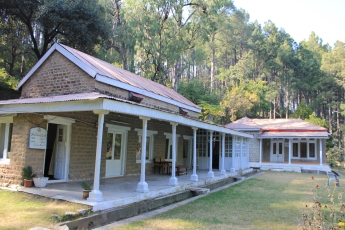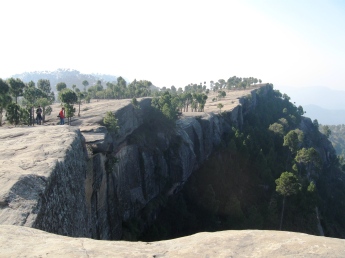Brigadier (R) Javed Ahmed Satti was born in a hilly village of Kahuta hills in Rawalpindi district, who came from a very modest background. He was assisted in his education by Lt. Commander Muhammad Azeem Satti, his relative and an officer from Pakistan Navy, which enabled him to secure commission in the Army. He was a brilliant officer who, besides being talented, extremely motivated, such was the tenor with which he served till his retirement as a Brigadier. He was convinced that access to education made the difference to his life, he decided to repay the debt.
After his retirement, Brig Javed established Al-Azeem Trust with the aim of imparting quality education to deprived children of backward areas so as to enable them to realise their talent, both for livelihood generation and for being socially responsible.
Brigadier Javed, along with his wife, started the first school of Al-Azeem Trust in their village, Behand, Tehsil Kahuta, District Rawalpindi, in April 2002. The Programme aims at grooming talented children up to the time they are able to generate their livelihoods, whether it involves supporting their higher professional studies or exposing them to vocational training. The Children of parents who cannot afford the tuition fees are admitted. Yet, an excellent quality of education is maintained, for which teachers are trained. They display exceptional commitment, are well paid and the academic standards are strictly monitored.
A unique education system has evolved in Kahuta region over the last thirteen years to endow the younger generation and the larger society with hope. The Al-Azeem School System is an outcome of labour of love a son of the soil who rose in his professional pursuits and chose to pay back.
The Al-Azeem School System is dedicated to quality education and brick and mortar figures out as the lesser priority. Education in the English medium is provided at the door steps and beneficiaries pay for the tuition consistent with their capacities. The marginalised access free education.
Al-Azeem School System is now financially self-sustaining. It provides quality education to over seven thousand students studying in twenty-two schools, from the primary level to the twelfth class.
Quality control figures out as perhaps the most challenging function in a major undertaking. Yet issues like chronic absenteeism, misdemeanours or financial embezzlement rarely figure out. The School System works on a unique ethos that equates commitment to education with core self-interests. In the beneficiary communities, the elders solidly support the programme as they see the future of their children through the Al-Azeem School System. For the senior teachers, delivering quality education derives self-esteem. The younger teachers endeavour to excel the standards that are set.
In a school in village Behand, neatly lined children were seen collecting wrappers and waste. The activity flows from one of the numerous lessons that promote ‘tarbiat’ or civil behaviour, alongside education. Others inculcate the virtues of compassion, sharing, social responsibility and attending to the personal hygiene. What they learn in schools is practised at home, thus bringing about a social change through the process of reverse osmosis.
Local educated women and younger girls practically run the entire School System which includes providing tuition and rendering administrative functions. Al-Azeem School System stands out as a model for women empowerment and sterling performance which is second to none. Its results rank among the best in the Rawalpindi Division and many students are accepted into the quality institutions for higher education.
As part of its social responsibility, Al-Azeem School System has over the years concertedly contributed in restoring the local forests. These efforts range from community based awareness raising, provision of watch and ward services and re-plantation of trees during monsoons. There is evidence of the pine and tree cover gradually reviving in the region and near denial of space for the timber mafias. An effective communities’ driven model is created which may be studied for wider replication. Environmental awareness can be gauged by the fact that even the local streams are cleaner from our standards.
Volunteerism more than anything else reflects social mobility in a society and fosters a sentiment of self-reliance. It is evident from the wider communities’ support for the Al-Azeem School System which includes activities like maintaining the road access to the schools, providing watch and ward functions and diverse services. The School System is being aptly supported by so many voluntary contributions.
An unswerving commitment to the future of the younger generation through quality education has welded together a sustainable bond between the beneficiary communities and the Al-Azeem School System. A situation where everyone stands to gain.
The Azeem Public School System has set high standards for teachers and students. Competent teachers are hired and are paid competitive salaries. Students are exposed to challenging curricula that provides a strong foundation of math and science, and instills confidence in them. During the past two years boys and girls from Azeem Public Schools have secured top positions in the annual board examinations.
Over the past decade, the dedicated educational service provided by the Al-Azeem Trust has raised the standard of primary education in the villages surrounding Islamabad. In future, Al-Azeem Trust plans to build institutions of higher learning to help their students pursue college education after they complete their secondary and higher secondary education.
The model of Azeem Public School System needs to be emulated all over Pakistan to create level playing fields for the poor children. Kudos to Azeem Public School System for illuminating the lives of the poor children with the flames of educational discovery and curiosity.
Recently a new “Taj Mosque” was inaugurated at the main campus of the Azeem Public School system, located in the village of Behand. The mosque, located on the mountain top, is named after Brig. (R) Javed’s mother “Taj.” The design of the building is the brainchild of Air Commodore Ahmed Salam Khan.
Brigadier (R) Javed Ahmed Satti has been awarded the President’s Award for Pride of Performance for excellence for services to Pakistan on 23rd March 2018.


















